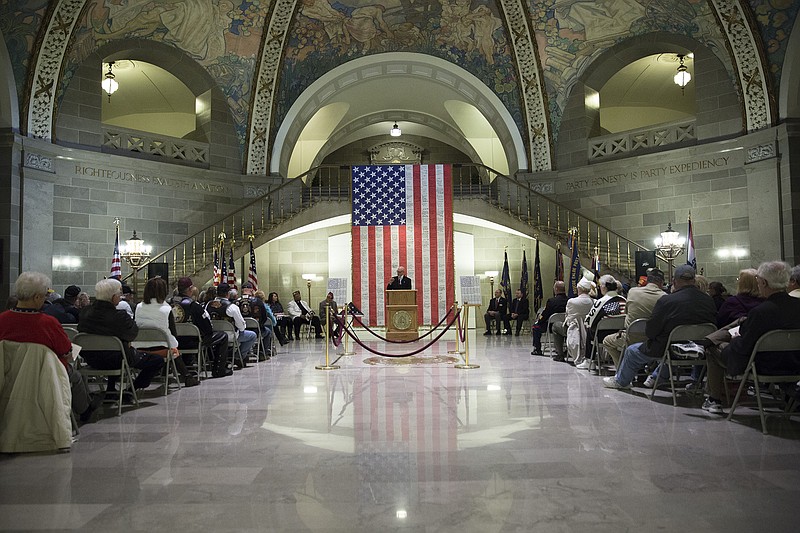Columbia native John Clark went to the University of Missouri after graduating from Hickman High School, and graduated from MU in 1963 with an engineering degree and an Air Force ROTC second lieutenant's commission.
On March 12, 1967, Capt. Clark had flown more than 80 combat missions over Vietnam, but was shot down - and spent the next six years, 11 months as a North Vietnam prisoner of war.
"I have, also, carried the demons that dwell deep in the minds of those who have suffered the trauma of war and survival," Clark said Monday, during a Veteran's Day address in the Capitol Rotunda, after noting that the veterans in that audience "are among the 1 percent who truly understand the cost and scope of our freedom - its threats and what it will require to keep it secure."
Today, he said, we're learning more about the effects of "mental and psychological fatigue and trauma that is evidenced by the enormously high suicide rate of our returning veterans - twice as many vets commit suicide after returning home, as die in combat."
After being released from captivity in 1973, Clark remained in the Air Force, then resigned his regular commission in 1977 and joined the Guard and Reserve forces.
He said after his speech that his anxiety and post-traumatic stress disorder weren't identified for about 20 years.
"Were it not for my wife, and those Navy and VA professionals who recognized my struggles even though I tried to keep them to myself," he told the nearly 100 veterans and their family members and friends in the Capitol Monday, "I would not be speaking with you now."
Clark told the News Tribune neither he nor his doctors made an immediate connection between his bouts of passing-out and his military experiences.
"Unfortunately, we're still learning about this," he said.
In his speech, he told veterans: "If you are one of our suffering heroes, seek help in retraining your mind to live in the "peace' for which you fought - just as it was trained and tempered to survive in war.
"We're not as good in retraining for peace as we are in training for war - but we really didn't know until just recently that we needed to."
That retraining can be done, he said - with help.
"You cannot do it yourself," Clark said. "It will not be easy - but you have proven over and over again that the word "hard' does not intimidate you - it will be well worth the struggle, for you have a long life to enjoy God's wonders, which are everywhere."
To those who never served, and don't understand the military experience, Clark noted that all veterans have been part of the team.
While flying his combat missions from a base in Thailand, Clark said, "I realized just how many people ... it took to get me there in that cockpit, ready to take off."
There was the van driver who took him and fellow pilots to breakfast, to briefings and then to the flight line, "the ever-present cooks and staff keeping the mess hall stocked with, among other things, chocolate milk and ice cream," the base operations staff, "the ground crews that took great pride in the aircraft - their aircraft" and many, many others stationed all around the world.
Before Clark spoke, Jefferson City Mayor Eric Struemph reminded the Jefferson City Veterans Council and their guests: "Veterans have a type of super-love for their country - a devotion to the American flag like no other, a never-ending commitment to freedom."
He also noted the many sacrifices America's veterans have made.
"That debt can never be repaid," Struemph said. "Americans are forever grateful to all of our veterans who have served and are serving today.
"We must embrace these heroes forever - our veterans."

